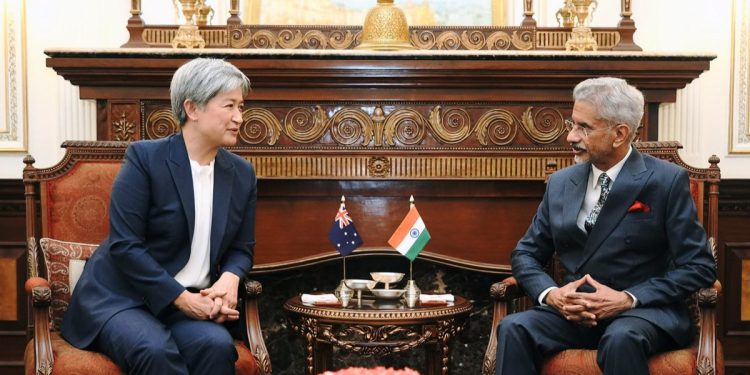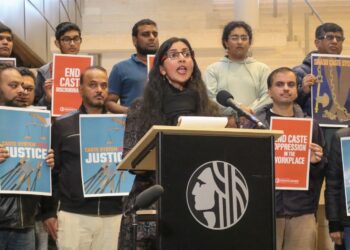In a collaborative effort to enhance economic and strategic relations, India and Australia affirmed their commitment on Tuesday. The top diplomats, Indian Foreign Minister Subrahmanyam Jaishankar and Australian counterpart Penny Wong, held discussions in New Delhi, expressing shared concerns regarding China, regional security, and the Israel-Hamas conflict.
The meeting followed talks between the defence chiefs of both nations, emphasising the comprehensive nature of their engagement. Minister Jaishankar highlighted the positive momentum in trade and defence ties between the two countries. The Indo-Pacific region emerged as a focal point, with both leaders underscoring their dedication to a free, inclusive, and rules-based Indo-Pacific.
While not explicitly naming China, Australian Deputy Prime Minister and Defence Minister Richard Marles, on Monday, underscored China’s status as a significant concern for both India and Australia.
Highlighting the pivotal role of China, Australian Deputy Prime Minister and Defence Minister Richard Marles stated, “For both of us, China is our biggest trading partner. For both of us, China is our biggest security anxiety.”
Since Australia’s 2018 decision to withhold the country’s 5G rollout, economic relations have improved following the 2022 election of a centre-left government. However, competition for influence in the Asia-Pacific region persists.
India faces heightened tensions with China along the shared but disputed border, leading to a historic low in bilateral ties. In addition to addressing bilateral concerns, India and Australia are actively collaborating to reinforce the Quad, a security alliance involving Japan and the United States.
Regarding the Israel-Hamas conflict, Indian Foreign Minister Subrahmanyam Jaishankar labelled Hamas’ October 7 attack on Israel as an act of terrorism. Describing the situation in Gaza as a “humanitarian crisis,” he stressed the need for urgent assistance.
Australian counterpart Penny Wong echoed India’s perspective, emphasising the dire humanitarian situation in Gaza. Wong also called for Israel to adhere to international law, including the protection of civilians, in its actions. The two nations also urged for the immediate release of all remaining hostages.
The joint statement said, “Noting horrific terrorist attacks against Israel on 7 October 2023, both sides reaffirmed that they stand with Israel against terrorism and called for adherence to international humanitarian law, including the protection of civilians. They called for the immediate release of all remaining hostages.”
In the 2+2 Ministerial dialogue, ministers from both India and Australia expressed deep concern over the escalating situation in Myanmar, emphasising its potential repercussions on regional security and stability.
The ministers jointly called for an immediate halt to violence, the release of all arbitrarily detained individuals, secure access for humanitarian assistance, and a resolution of the crisis through dialogue, progressing towards a federal democracy.
Meanwhile, according to the joint statement, India and Australia addressed ongoing developments in the Indo-Pacific, Middle East, and Ukraine, and voiced “deep concern” over the Ukraine situation.
In a collective stance, they reiterated their backing for ASEAN-led initiatives aimed at addressing the Myanmar crisis. The ministers urged the full implementation of ASEAN’s Five-Point Consensus, according to the joint statement issued after the dialogue.
In the recently concluded India-Australia 2+2 Ministerial Dialogue on Monday, External Affairs Minister Jaishankar and Defence Minister Rajnath Singh engaged with their Australian counterparts, Foreign Minister Penny Wong and Defence Minister Richard Marles.
Australian Foreign Minister Wong, in her opening remarks, emphasised Canberra’s deep appreciation for its bilateral ties with New Delhi, highlighting its critical role in a region where sovereignty is upheld. Wong acknowledged the substantial collaborative efforts between the two nations and expressed optimism about further collaboration.
Minister Jaishankar, during the meeting, underscored the rapid growth of the bilateral relationship between India and Australia, emphasising its broader implications for the region. He specifically highlighted the significance of the partnership in the Quad format, describing it as “very beneficial” for both bilateral relations and the broader Indo-Pacific region.











